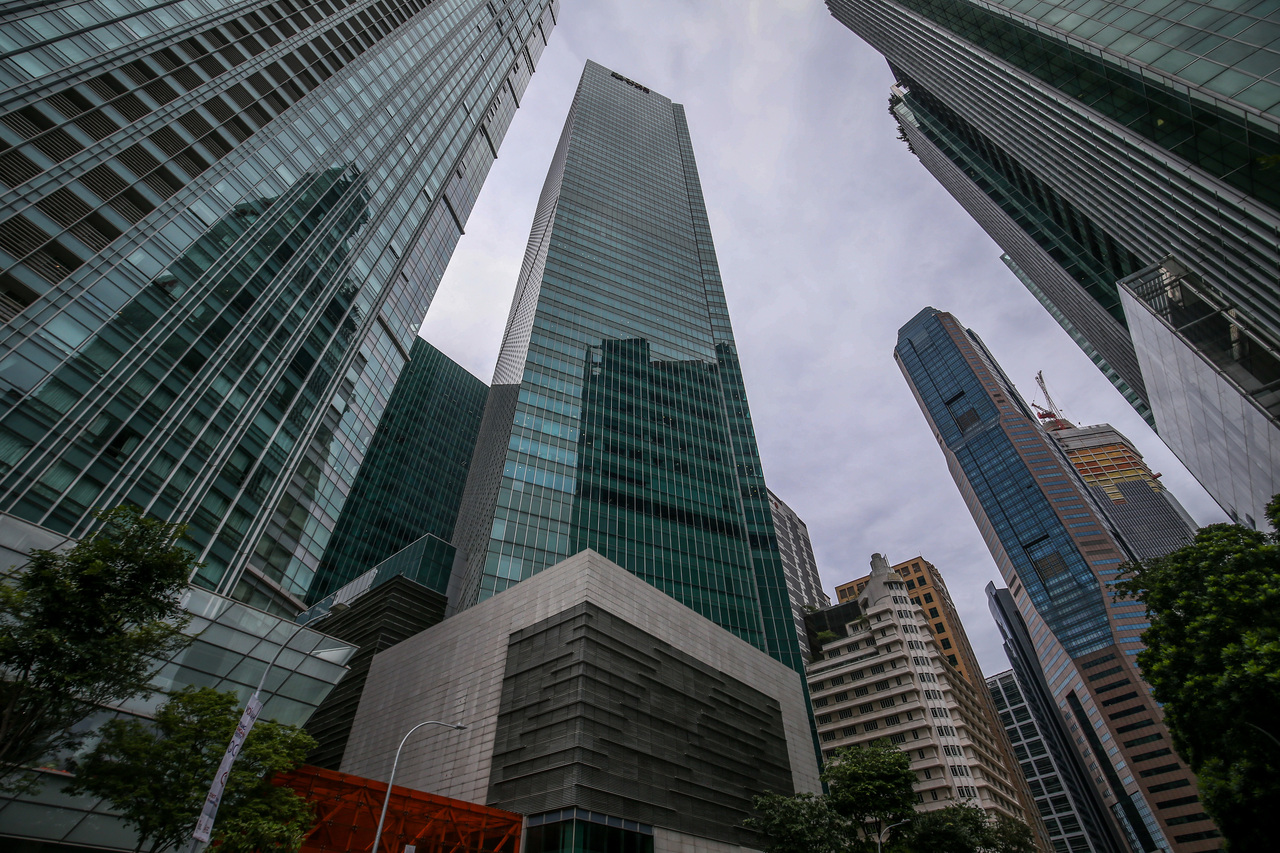Top moneymaker at Deutsche Bank sits in Marina Bay office in Singapore
Sign up now: Get ST's newsletters delivered to your inbox

The biggest moneymaker at Deutsche Bank is Mr Chetankumar Shah, who runs a team on the 18th floor of a glass office tower overlooking Marina Bay in Singapore.
PHOTO: LIANHE ZAOBAO
Follow topic:
SINGAPORE (BLOOMBERG) - To find the biggest moneymaker at the rarely moneymaking Deutsche Bank, you need to travel more than 10,200km from Frankfurt to the 18th floor of a glass office tower overlooking the green waters of Marina Bay in Singapore.
There, Mr Chetankumar Shah, a low-profile and publicity-shy banker in his early 50s, runs a team that oversees complex financing for clients ranging from Asian tycoons to an Indonesian conglomerate, while trading the distressed debt of companies including an Israeli shipping firm.
Mr Shah may not be a household name on Wall Street, but his global financing and credit trading group pulls in an estimated €3 billion (S$4.7 billion) annually, accounting for about a third of revenue for the entire investment banking division, people familiar with the matter said.
After working alongside former fixed-income veterans like Mr Sajid Javid, now a British lawmaker, and SoftBank Group's Mr Rajeev Misra, Mr Shah now heads a unit that is the top money generator for the investment bank for most quarters, the people said, declining to be identified as the details are not public.
His importance underscores how even after years of trying to retreat from volatile businesses, Deutsche Bank has not been able to pull away from activities that pose risks if markets turn.
Chief executive officer Christian Sewing is targeting revenue growth after a relentless cost-cutting drive, returning to credit default swaps and possibly base metals trading. The firm's primary regulator has already expressed concern about risks it is taking in leveraged loans - a familiar refrain for a bank whose recent stumbles led to the highest legal bills of any European lender, resulting in losses for five of the last six years.
Under Mr Shah's leadership, Deutsche Bank has cemented its role as one of the world's biggest credit traders. His global empire includes the distressed-debt trading business that has long been a strength of Germany's biggest bank, along with a lending unit that has served as a growth area after many Wall Street rivals pulled back in the wake of the financial crisis.
"He was one of the pioneers that helped us create the markets business virtually from scratch," said Mr Anshu Jain, the former Deutsche Bank co-CEO who worked with Mr Shah for more than a decade and is now president of Cantor Fitzgerald. "Chetan has a multi-decade track record of very good risk management.''
Amid all the recent turmoil at the bank that led to a string of executive departures, including those of Mr Jain and former CEOs John Cryan and Juergen Fitschen, Mr Shah has been a constant. He has outlasted six CEOs during his 15-plus years on the credit team, working as head or co-head for the last six years.
Despite the billions his team brings in, Mr Shah avoids the limelight from his nondescript corner office in the heart of Singapore's financial district. He declined to comment or be photographed for this story. A vegetarian teetotaller who loves cricket, Mr Shah does not even have a LinkedIn profile. He remains an "enigma" even to one banker who has worked alongside him for a decade.
Born in India, Mr Shah studied at the prestigious Indian Institute of Management Ahmedabad, one of just three students graduating with a medal for academic performance. He joined Deutsche Bank in 1994, initially trading Indian rates and treasury bonds in Mumbai, before eventually becoming head of global credit trading.
He moved to Singapore in 2005, joining many financiers attracted to the financial hub for its close proximity to other Asian markets. Lower taxes are also a draw for many bankers, as Singapore's top marginal income tax rate of 22 per cent is less than half the level of Germany.
At the time, Asia was taking on a more important role for the bank, which was expanding beyond its early roots after setting up a Singapore outpost in the 1970s to help German companies such as BMW and Siemens expand in the region.
As head of global credit trading and financing, Mr Shah reports to investment bank head Mark Fedorcik and Mr Ram Nayak, who runs the fixed-income and currencies business. His team, spread across Hong Kong, New York and London, makes money trading distressed debt and offering private credit in sectors from real estate to renewable energy in Europe, Asia and the United States, people familiar with the business say. It also houses a mishmash of Deutsche Bank's more complex loans.
Mr Shah's business is showing no signs of slowing. Mr Fedorcik said recently that revenue from trading securities accelerated in August and the first weeks of September after a slow start to the quarter. He confirmed guidance that revenue for the division - which includes Mr Shah's unit - will be about €9.3 billion this year. The bank is scheduled to report results on Oct 27.
For Mr Shah and his global team, the question now is whether they can keep the momentum going.
As Dr Angela Gallo, a senior finance lecturer at the Bayes Business School in London, points out, the risks of these trades are much like structured products from the global financial crisis.
"The market underestimates the joint probability of having both credit markets and collateral markets in distress, especially when the latter are illiquid markets," she said. "If you add complexity to the mix, the opaqueness adds risks to any trading deals."

